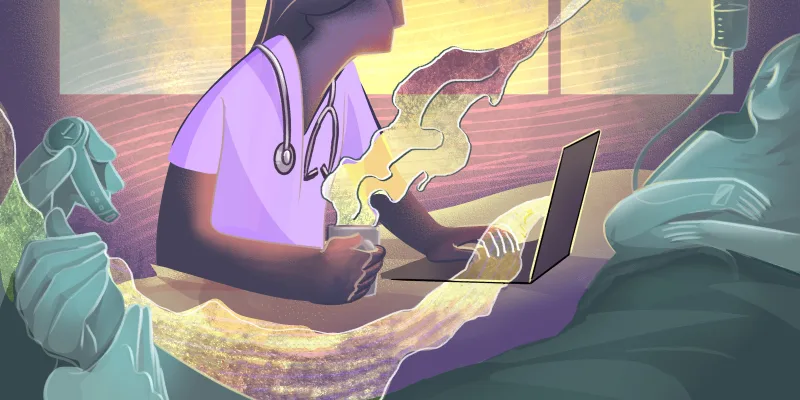The practice of diagnosing patients based on their race and thinking about diagnoses on the basis of patient race is ingrained in us from the first day of medical school. We start learning about diagnoses that disproportionately affect specific racial or ethnic groups and only hear about the race of the patient in standardized question stems if it relates to their diagnosis. In my four years of medical school at a reputable university, I was never once given a session on avoiding this practice of race-based medicine or even what it means to engage in race-based medicine. Only because I was a young Black woman with a background in critical analysis of racism and sexism did it occur to me that race-based medicine was what was happening.
Race-based medicine is founded on the non-scientific assumption that, as the AMA puts it, “Races are biologically distinct groups determined by genes.” It assumes that a patient has a certain illness based on their race, which can lead to an inaccurate assessment of that patient’s health status, and therefore to health disparities.
When I looked around me, I saw race-based medicine playing out in the questions being asked of non-white patients, as well as the manner in which they were asked. Often, these questions were potentially offensive and hurtful. In the wake of the damage, here are four ways every clinician can combat and avoid performing race-based medicine in their practice.
1) DO: Avoid racial anchoring bias.
Anchoring bias is when we over-rely on the first piece of information we have about a person. In the context of race-based medicine, this looks like meeting patients who come into clinic and assuming they have a disease based on their racial/ethnic background. It’s important to remember that not all middle-aged Black women without smoking histories who show up with a cough have sarcoidosis. Not all young Black women with strange constellations of symptoms have lupus. Not all Black people live in poverty or have asthma or are addicted to drugs. Keeping a broad differential regardless of the patient’s racial or ethnic background will allow you to best serve, diagnose, and treat them. While the race of the patient commonly comes up on our board exams, Black people can have any illness or disease that white people can have, and vice versa.
2) DO: Ask patients where they grew up.
When working with patients who may be Brown and potentially have heritage from multiple countries, avoid asking them “Where are you from?” This is a loaded question and can feel like being asked “Why are you Brown?” or “Why didn’t you grow up in the U.S.?” The question that is actually pertinent to us clinicians is where a patient grew up and what their exposures have been to specific kinds of infectious diseases.
Next time you encounter a patient whose heritage you don’t know, you can tell them, “I try to think with all of my patients about what exposures they might have had. Where did you grow up? Have you ever spent time outside of the U.S.?” Asking every patient this question will not only help you identify diseases from countries outside of the U.S. in people who are non-white, it will also help you identify diseases from people who may have spent significant amounts of time on military bases or who appear to be of European descent and are not. The bias that comes with assuming people are from certain countries hurts everyone and causes us to provide poorer care.
3) DON’T: Offer genetic testing to patients based on their ethnic background.
It’s common in the ob/gyn field to ask patients about their ethnic backgrounds and to use this information to decide what kinds of genetic testing and carrier screening to order for their family. However, in many countries, especially the U.S., it is almost impossible to know how consistent someone’s genetic line is and whether or not they have relatives they do or do not know about who were of different racial backgrounds than themselves. It is therefore reasonable when discussing genetic testing to offer everything to all patients, and not zero in on what kind of diseases you think that person might be predisposed to based on your assumptions about their ethnic background.
4) DON’T: Assume extensive work with a patient population to which you do not belong makes you an expert on that population.
It’s understood that people, especially those from marginalized groups, are experts on their own lives. However, when we spend an extensive amount of time working with marginalized groups to which we do not belong, it can become easy to believe we are also experts on those lives. This follows from every other way we are trained in medicine. Residency, fellowship, and years of work in a field is what gives us the right to call ourselves experts in a subject.
However, we turn on and off our identities as physicians. At home we are just people, not doctors, and our own identities are not always the same as those of our patients. If we do not belong to certain marginalized groups, we will never know what it is like to be a member of those groups, no matter how much time we spend working with them. Understanding this keeps us humble and also allows us to avoid anchoring on diagnoses or assuming things about each of our patients just because we have seen those patients before. The recognition patterns that we use in medicine to diagnose conditions are often inappropriate when it comes to dealing with patients. Checking these assumptions at each patient door prevents us from stumbling and failing to provide proper care.
The very fabric of medicine in the United States is racist. It promotes race-based medicine and shallow assumptions that lead to non-individualized care. Racism isn’t going anywhere in the U.S., nor is it going anywhere in medicine. But we may each take small steps to combat race-based medicine and provide high quality care to every patient we see.
How do you combat race-based medicine in your own practice? Share your strategies in the comments below.
Micaela Stevenson is a fourth year medical student at the University of Michigan Medical School. She is applying into obstetrics and gynecology with plans to become a reproductive endocrinologist.
Image by fedrelena / Getty







